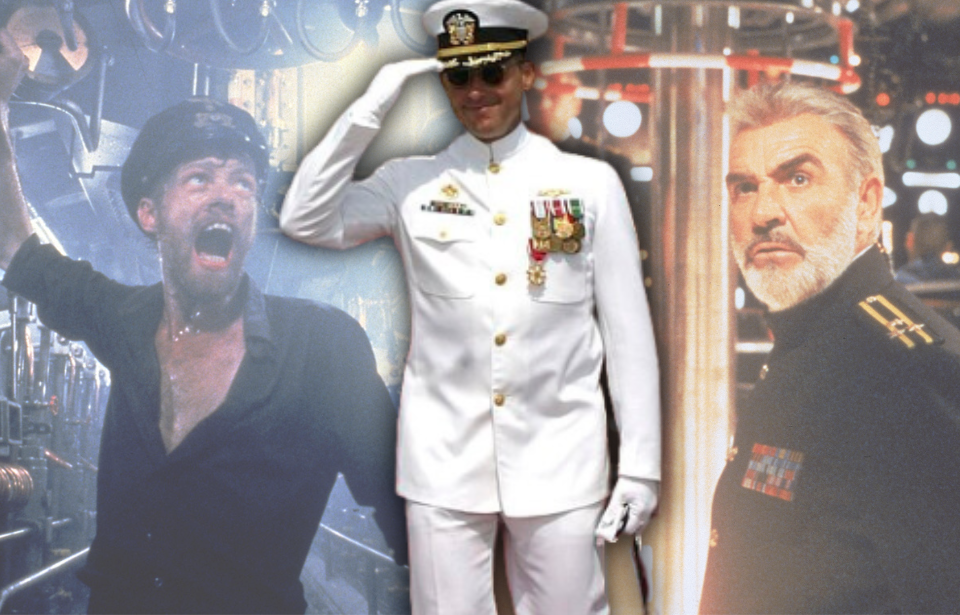Some of the most exciting war films ever made revolve around submarines. In an interview with Insider, retired American Submarine Commander Capt. David Marquet rates a number of scenes from various movies, explaining which ones are accurate and which are the product of poetic license.
Marquet served as the commander of the Los Angeles-class attack submarine USS Santa Fe (SSN-763), taking the vessel from the worst in the fleet to the most successful. As a result, it’s safe to say he knows his stuff.
The Hunt for Red October (1990)
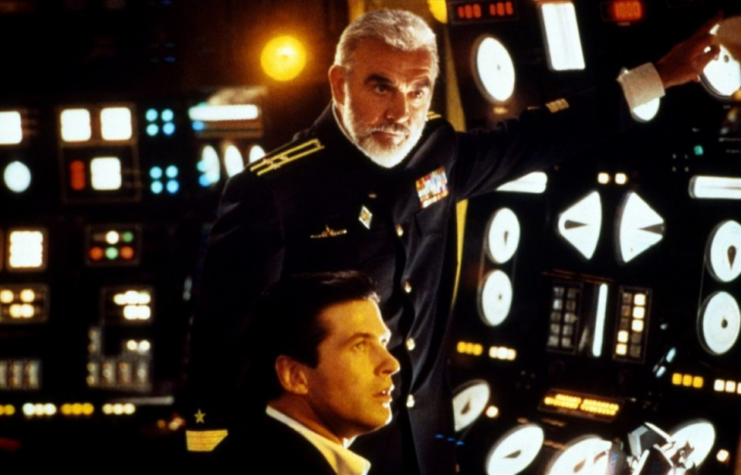
The first film David Marquet rates is The Hunt for Red October (1990).
After Jack Ryan (Alec Baldwin) and other crewmen from the USS Dallas (SSN-700) go aboard the Soviet vessel Red October, a torpedo is heard approaching the submarine. One Russian exclaims that “the Americans are shooting at us again,” to which PO Ronald “Jonesy” Jones (Courtney Vance) responds, “The pitch is too high; the torpedo is Russian.” Marquet shares that this is accurate, as each torpedo type has a slightly different sound.
Marquet also says that Sean Connery and Scott Glenn’s portrayals of Capt. Marko Ramius and Cmdr. Bart Mancuso are accurate. They’re “cool as cucumbers,” and Marquet confirms that “this is exactly the way submarine commanders are.”
The Hunt for Red October isn’t without its issues, however, such as Connery ordering the reactor to go to 115 percent, which Marquet quickly corrects, saying you only go to 100 percent – no more.
H gives The Hunt for Red October a rather positive rating of 8/10.
The Simpsons (1989-present)

In 1998, The Simpsons (1989-present) aired “Simpson Tide,” an episode focused around Homer joining the US Naval Reserve after being fired from the Springfield Nuclear Power Plant.
At one point, the submarine he’s aboard begins to fill with water, something David Marquet explains as sending “shivers up my spine because this is the worst fear of all submariners.” If water enters, that area becomes heavier, tipping the vessel downward. As Marquet explains, “That’s how you die on a submarine.”
It appears the water is entering through a hole in the hull. However, Marquet says it would be spraying “harder than any water cannon you have ever seen, and they show it as trickling as a limp garden hose.” Homer ends up solving the problem by pushing an earring into the hole, and all the ex-submarine commander can say is “no.”
According to Marquet, “The most realistic thing in this whole scene is the guy underwater drinking beer.” As such, this episode of The Simpsons receives a rather poor rating of 3/10.
Crimson Tide (1995)
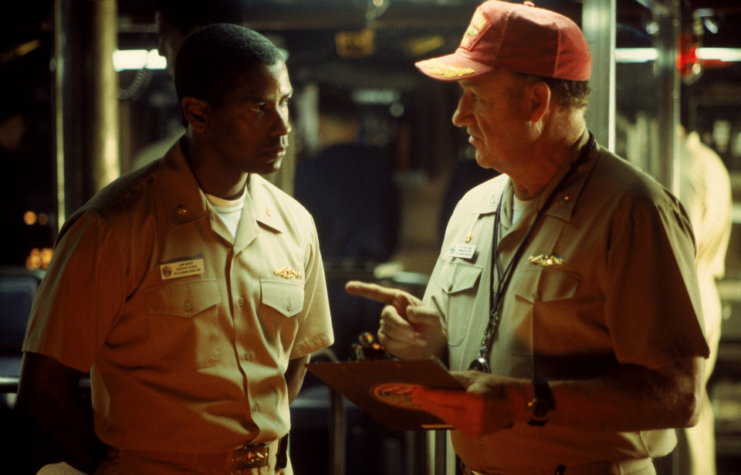
David Marquet also puts Crimson Tide (1995) to task in his interview with Insider.
Speaking about a scene involving Lt. Cmdr. Ron Hunter (Denzel Washington) and Capt. Frank Ramsey (Gene Hackman), he concedes that the dialogue is “exactly right.” However, he admits that Hackman’s character takes it too far during the pair’s argument over the launching of nuclear weapons when he orders Hunter’s arrest for mutiny.
He clarifies that this “mutiny” is a complete fantasy and that a real one would need to see more than one individual actually go against the commander – one person cannot commit a mutiny. While the scene and drama are exciting to the viewer, Marquet explains how it was fabricated by some “Hollywood people.”
His rating for Crimson Tide is a mediocre 4/10.
K-19: The Widowmaker (2002)
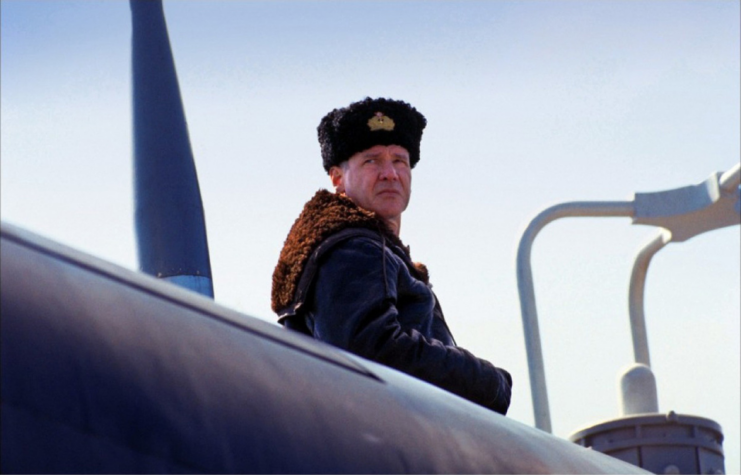
There are some significant issues with the scene David Marquet rates from K-19: The Widowmaker (2002).
After K-19 has an accident involving her reactor, Capt. Alexei Vostrikov (Harrison Ford) tells the crew that an explosion could occur, detonating the nuclear warheads onboard. Marquet is quick to correct this, saying, “No, reactors don’t explode. This, unfortunately, is perpetuating a myth that we have to fight nuclear power, that reactors are somehow like nuclear weapons and that reactors can explode like nuclear weapons can.”
Marquet explains that a reactor won’t explode – however, it could melt down. If it did explode for some odd reason, the chances that this would detonate secondary weapons is zero. They’re designed to not detonate because of outside explosions and only do so when a specific detonation sequence is followed.
K-19: The Widowmaker receives a dismal rating of 0/10. As Marquet explains, “Not only is it totally unrealistic, but it perpetuates some of the unhelpful myths about nuclear power.”
Act of Valor (2012)

In a scene from Act of Valor (2012), a US Navy SEAL team boards a surfaced submarine. The vessel breaches the water’s surface at the last minute, the SEAL team quickly boards and then she dives again. She stays on the surface for the least amount of time possible because, as David Marquet jokes, “Submariners are allergic to sunlight.”
He adds that the whole point of a submarine is to remain underwater, explaining, “If you can be seen, you can be targeted; if you can be targeted, you can be shot; if you can be shot, you can be killed. So the best way to break that chain of events is at the very beginning.”
Overall, Act of Valor receives a favorable rating of 7/10.
Das Boot (1981)
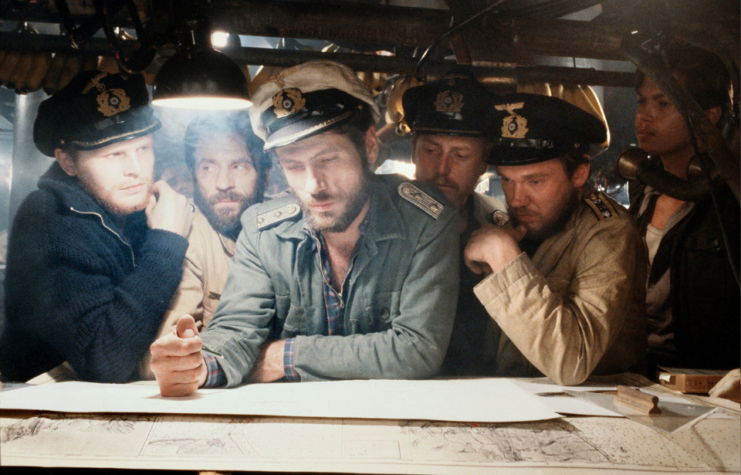
Arguably one of the most popular films David Marquet rates in Das Boot (1981).
In one scene, the German submariners rush to the front of the U-boat U-96, to help her submerge faster. This ultimately turns out to be practice, with Marquet explaining that U-boats during World War II were more like submersibles than submarines. The big difference is that submersibles spend most of their time on the surface, while submarines spend the majority underwater.
If a U-boat was on the surface and her crew saw an aircraft coming toward them, they’d have to submerge as quickly as possible. “So what’s happening is the people on the bridge are coming down… At the same time, we’re opening the vents and flooding the submarine and tipping it deep.” Given this, Marquet describes the scene as a “highly choreographed and synchronized event.”
Das Boot receives a rating of 10/10.
Watch the video!
More from us: Samurai Sword Master Kaito Suiju Rates Japanese Sword Movie Scenes
Want War History Online‘s content sent directly to your inbox? Sign up for our newsletter here!
After reading what David Marquet had to say about these films, watch the video and see what you think. Do you agree with his analysis and ratings, or would you have voted differently?
